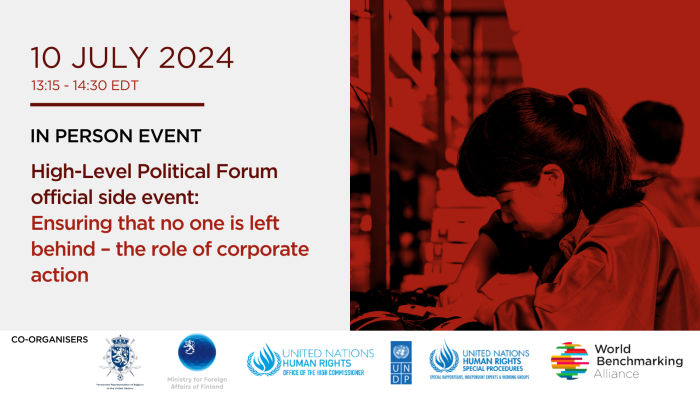HLPF official side event: Ensuring that no one is left behind – the role of corporate action

Join this official side-event of the 2024 High-Level Political Forum (HLPF) on Sustainable Development in New York City to find out out how the are the world’s most influential 2,000 companies performing on social issues.
Wednesday 10 July 2024 from 13:15–14:30
Conference Room D, UN Building, New York
Co-organisers: Permanent Mission of Belgium to the United Nations, Permanent Mission of Finland to the United Nations, Office of the UN High Commissioner for Human Rights, UN Special Rapporteur on the Right to Development, United Nations Development Programme, and the World Benchmarking Alliance
This roundtable aims to facilitate a data-driven dialogue to strengthen corporate accountability on social issues. The World Benchmarking Alliance will share on overview of its just-published inaugural Social Benchmark – a comprehensive assessment of the 2,000 most influential companies globally that provides a holistic view of their contributions towards respecting human rights, providing and promoting decent work, and ethical conduct. Aligning with the HLPF 2024 theme of ‘Reinforcing the 2030 Agenda and eradicating poverty in times of multiple crises’, the Social Benchmark aims to provide a state of play on corporate actions on the Leave No One Behind principle of the 2030 Agenda. The roundtable presents a unique opportunity to engage a diverse array of stakeholders including governments, UN agencies, civil society organisations, private sector entities, and investors on understanding the existing gaps and efforts needed to address them.
Please note that to attend this event you will need to be registered to attend HLPF and have a UN ground pass. Learn more about registration and participation at HLPF.
Register to attendBackground
The ongoing global economic recovery is marred by conflicts, the climate crisis, inflation, supply chain disruptions, labour market pressures, and unsustainable debt in developing nations. These issues have led to an uneven and unjust distribution of benefits resulting in increasing inequalities within and among countries. This situation poses a threat to global sustainability frameworks such as the 2030 Agenda and its Sustainable Development Goals (SDGs) and the Paris Agreement, particularly impacting marginalised or vulnerable populations who are often being pushed further and further into poverty. Without transformative measures that apply human rights norms and standards and are aligned with the UN Guiding Principles on Human Rights, millions of people, especially in the Global South, will be left behind.
The promise to “Leave No One Behind” and prioritise those furthest behind is integral to the 2030 Agenda for Sustainable Development. Delivering on this promise requires political will, targeted and inclusive policy interventions, and the clear commitment of all stakeholders. Businesses have crucial role to play on this: through their operations they touch the lives of millions of employees and consumers and their communities, linking economies and geographies around the globe. As such, business action can drive significant and positive impact towards achieving the SDGs. While business has historically contributed to human development, current business models are leaving too many behind and contributing to rising inequalities. While progress has been made in the last decade with the introduction of voluntary and mandatory frameworks to enhance transparency, human rights due diligence and corporate accountability, significant gaps remain.
The world’s most influential companies – who have the means to change the living realities of so many people – are falling short of socially responsible business conduct and contributing to a human rights economy. Companies have human rights responsibilities, which include conducting meaningful human rights due diligence in line with the UN Guiding Principles on Business and Human Rights. We continuously see significant gaps in companie conducting human rights due diligence and applying human rights-based approaches, including meaningful and inclusive stakeholder engagement, which limits the influence of rightsholders, particularly from the Global South.
Roundtable structure
- A presentation of findings from the Social Benchmark, highlighting key trends, areas for improvement and good practice examples. This will set the stage for informed discussions and action plans.
- A panel discussion featuring experts from governments, business, civil society, financial institutions, and international organisations, providing insights into the role of the private sector in achieving the Leave No One Behind agenda and fostering sustainable development.
- Stakeholder Dialogue to share perspectives, exchange ideas, and explore collaborative initiatives.
Speakers
- H. E. Ambassador Paula Narváez: 79th President of ECOSOC and Ambassador and Permanent Representative of Chile to the United Nations
- Ambassador Godfrey Kwoba: Ambassador and Deputy Permanent Representative of Uganda to the United Nations
- Pasi Hellman: Under-Secretary of State for Development Policy, Ministry of Foreign Affairs, Finland
- Mr. Wim Schaerlaekens: Strategic Advisor to the Director-General for Development Cooperation and Humanitarian Aid, Belgian Ministry of Foreign Affairs
- Surya Deva: UN Special Rapporteur on the Right to Development and Professor at Macquarie Law School
- Rose Omamo: Deputy President of the International Trade Union Confederation for Africa (ITUC-Africa)
- Katy Thompson: Head of Rule of Law, Security, and Human Rights, UNDP
- Ewa Staworzynska: Director of Corporate Responsibility and Labor Affairs, USCIB
- Namit Agarwal: Social Transformation Lead, World Benchmarking Alliance
- Sofía del Valle: Social Engagement Lead, World Benchmarking Alliance